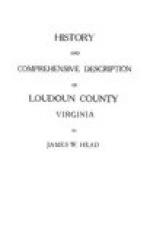Entire communities of women and children were left in their charge, while all able-bodied white men were away on the battlefield, and the trust was faithfully kept. Instances of criminal acts were so rare that at this period none are recalled, and while this fidelity is proof of the peaceable character of the negro, it is also evidence for their owners that slavery had produced no personal hostilities between the two races in Loudoun County, and that the treatment of the negro by his owner under the law had been such as to maintain between them personal attachment and mutual confidence. Many negroes accompanied their owners to the seat of war, not to take part in battle, but to serve in semi-military duties without exposure to danger. Some of them marched in Maryland and Pennsylvania with the armies of Lee, voluntarily returning, although they might have remained in the free States without hindrance. They are still proud of the conduct of their race in those days of anxiety and peril.
The proclamation of President Lincoln was regarded in Virginia as a strictly political war measure, designed to place the cause of war distinctly upon the sole question of slavery for an effect to be produced upon foreign countries and with the purpose of making use of negroes as soldiers in the Federal army. The issue of negro freedom had not been distinctly made until this proclamation created it. Hitherto it had been understood that, at the furthest, the Federal authorities would insist only on restriction of slavery to the limits where it already existed and a gradual emancipation upon payment of the value of slaves held at the beginning of the war. But now it was settled that the United States proposed to enforce by arms an instantaneous emancipation without compensation.
Close of the War.
The half-clad and impoverished southern armies, after four years of valiant fighting, were no longer able to withstand the superior numbers that had confronted them with merciless regularity in every important conflict of the war, and, in April, 1865, the struggle ceased with the complete subjugation of the Southland.
All that the States-rights supporters had prophesied would be accomplished if unresisted; all that the Unionists had indignantly denied to be the objects of the war was accomplished: the South was conquered, State sovereignty repudiated, the slaves were freed, and the recognition of negro political equality forced upon the nation.
Neighborhood strifes and animosities had been engendered in every village and hamlet, and in nearly every household mothers wept for the lost darlings asleep in their unmarked graves. The women and children, hearing with a shock of the surrender, experienced a terrible dread of the incoming armies. The women had been enthusiastic for the Confederate cause; their sacrifices had been incalculable, and to many the disappointment and sorrow following defeat were more bitter than death. The soldier had the satisfaction of having fought in the field for his opinions and it was easier for him to abide by the decision of arms.




